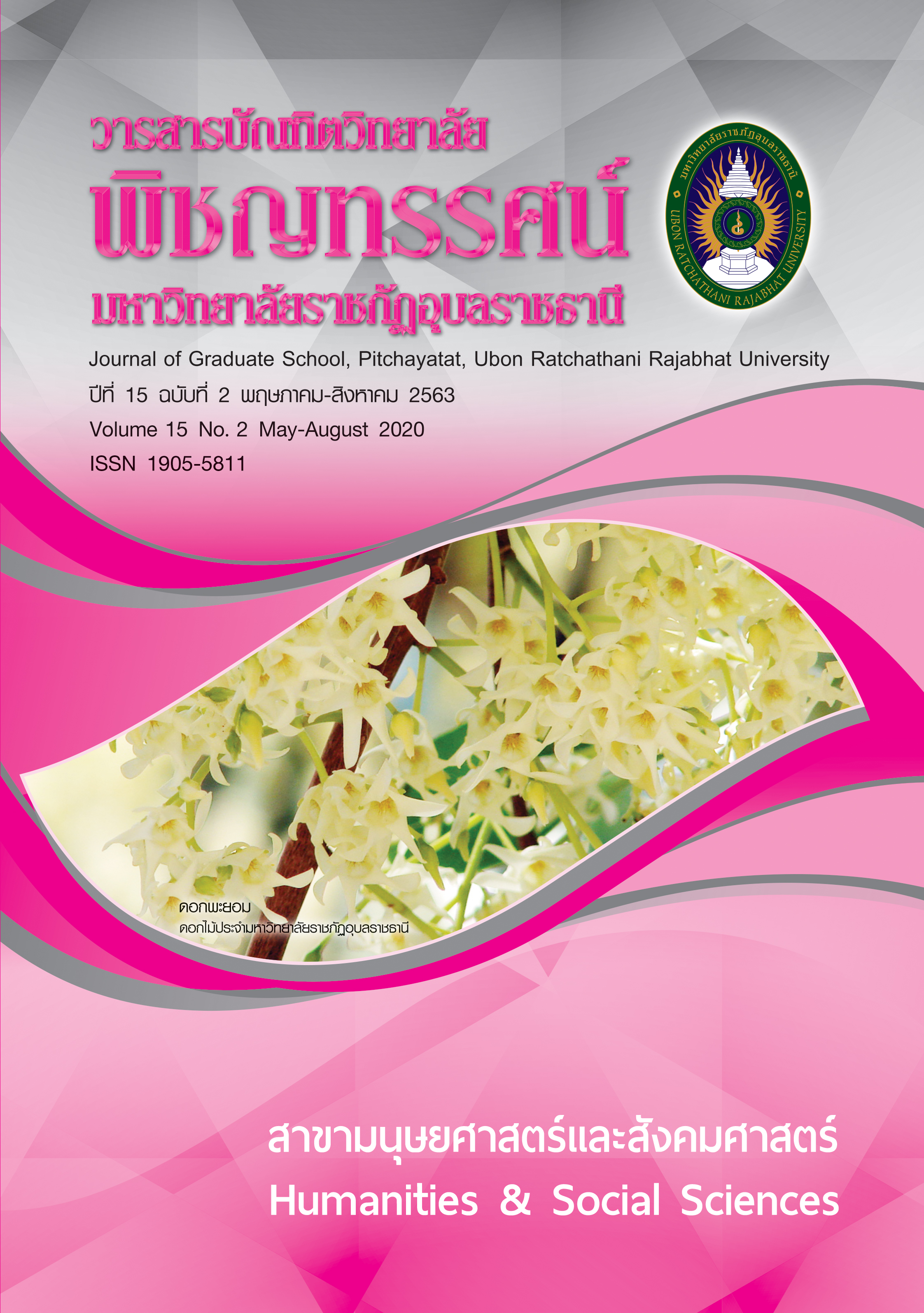รูปแบบการพัฒนาภาวะผู้นำการเปลี่ยนแปลงตามหลักพุทธธรรม ของผู้บริหารโรงเรียนในสังกัดเทศบาลนครนครสวรรค์
คำสำคัญ:
รูปแบบการพัฒนา, ภาวะผู้นำการเปลี่ยนแปลง หลักพุทธธรรม, ผู้บริหารโรงเรียนบทคัดย่อ
การวิจัยนี้มีวัตถุประสงค์เพื่อ 1) ศึกษาสภาพการพัฒนาภาวะผู้นำการเปลี่ยนแปลงของผู้บริหารโรงเรียนในสังกัดเทศบาลนครนครสวรรค์ 2) สร้างรูปแบบการพัฒนาภาวะผู้นำการเปลี่ยนแปลงตามหลักพุทธธรรม ของผู้บริหารโรงเรียนในสังกัดเทศบาลนครนครสวรรค์ และ 3) ประเมินรูปแบบการพัฒนาภาวะผู้นำการเปลี่ยนแปลงตามหลักพุทธธรรม
ของผู้บริหารโรงเรียนในสังกัดเทศบาลนครนครสวรรค์ ระเบียบวิธีวิจัยเป็นการวิจัยเชิงคุณภาพ แหล่งข้อมูลการวิจัยได้แก่ เอกสารและผู้ให้ข้อมูลสำคัญ เครื่องมือที่ใช้ได้แก่ แบบวิเคราะห์เอกสาร แบบสัมภาษณ์กึ่งโครงสร้าง และแบบประเมินรูปแบบภาวะผู้นำการเปลี่ยนแปลงตามหลักพุทธธรรม สถิติที่ใช้ได้แก่ร้อยละ และการวิเคราะห์เนื้อหา
ผลการวิจัยพบว่า
- สภาพของการพัฒนาภาวะผู้นำการเปลี่ยนแปลงของผู้บริหารโรงเรียนในสังกัดเทศบาลนครนครสวรรค์ โดยภาพรวม อยู่ในระดับมาก เมื่อพิจารณารายด้านพบว่าทุกด้านอยู่ในระดับมาก ด้านที่มีสภาพของการพัฒนาสูงสุดคือ การเข้าใจการเปลี่ยนแปลง
- รูปแบบการพัฒนาภาวะผู้นำการเปลี่ยนแปลงตามหลักพุทธธรรมของผู้บริหารโรงเรียนในสังกัดเทศบาลนครนครสวรรค์ ผู้บริหารใช้องค์ประกอบ 5 ประการของภาวะผู้นำการเปลี่ยนแปลงบูรณาการเข้ากับหลักสัปปุริสธรรมในการพัฒนาภาวะผู้นำการเปลี่ยนแปลง ได้แก่ 1) การมีอิทธิพลอย่างมีอุดมการณ์ (ธัมมัญญุตา อัตตัญญุตา) ผู้บริหารโรงเรียนแสดงบทบาทและเป็นแบบอย่างให้ผู้ร่วมงานเกิดความไว้วางใจ ผ่านการแสดงออกทางทักษะความสามารถ บุคลิกลักษณะ และคุณธรรมจริยธรรม 2) การสร้างแรงบันดาลใจ (อัตถัญญุตา) ผู้บริหารโรงเรียนต้องมีกระบวนการทำให้บุคลากรยึดมั่นกับเป้าหมายขององค์กร กำหนดเป้าหมาย วิสัยทัศน์ขององค์กรอย่างชัดเจน ถ่ายทอดเป้าหมาย วิสัยทัศน์อย่างปลุกเร้าและ
มีประสิทธิภาพ 3) การกระตุ้นทางปัญญา (มัตตัญญุตา) ผู้บริหารโรงเรียนพัฒนาตนให้เป็นผู้นำในการสร้างวัฒนธรรมการเรียนรู้แก่องค์กร ส่งเสริมการพัฒนาความรู้ กระตุ้นความคิดสร้างสรรค์ และสร้างความรู้สึกท้าทายในการทำงานแก่บุคลากร
4) การคำนึงถึงปัจเจกบุคคล (ปุคคลัญญุตา) ผู้บริหารโรงเรียนสร้างสัมพันธภาพเชิงบวกในองค์กร ดูแลเอาใจใส่ เรียนรู้เข้าใจในความแตกต่างหลากหลายทางศักยภาพของบุคคลากร เปิดโอกาสให้บุคลากรได้แสดงศักยภาพตามความถนัดและความสามารถพิเศษของตน 5) การเข้าใจการเปลี่ยนแปลง (กาลัญญุตา ปริสัญญุตา) ผู้บริหารโรงเรียนพัฒนากระบวนการปรับตัวให้สอดรับกับการเปลี่ยนแปลง ตระหนักเรียนรู้ถึงแนวโน้มความเปลี่ยนแปลง และเตรียมความพร้อมเพื่อรับมือกับอิทธิพลความเปลี่ยนแปลง
- รูปแบบการพัฒนาภาวะผู้นำการเปลี่ยนแปลงตามหลักพุทธธรรมของผู้บริหารโรงเรียนในสังกัดเทศบาลนครนครสวรรค์ มีความเหมาะสม เป็นประโยชน์ มีความถูกต้อง มีความเป็นไปได้ในการนำไปปฏิบัติ
คำสำคัญ: รูปแบบการพัฒนา ภาวะผู้นำการเปลี่ยนแปลง หลักพุทธธรรม, ผู้บริหารโรงเรียน
เอกสารอ้างอิง
เทศบาลนครสวรรค์. ข้อมูลพื้นฐาน เทศบาลนครนครสวรรค์. (ออนไลน์) 2556 (อ้างเมื่อ 8 กรกฎาคม 2561). จาก: http://www.nsm.go.th/information.php
ธรรมรักษ์ ธนภณ. รูปแบบการพัฒนาภาวะผู้นำเชิงกลยุทธ์ของผู้บริหารสถานศึกษาสังกัดสำนักงานคณะกรรมการการศึกษาขั้นพื้นฐาน. วิทยานิพนธ์ปรัชญาดุษฎีบัณฑิต มหาวิทยาลัยบูรพา, 2557.
นิกัญชลา ล้นเหลือ. โมเดลสมการโครงสร้างภาวะผู้นำเชิงวิสัยทัศน์ของผู้บริหารสถานศึกษาขั้นพื้นฐาน. วิทยานิพนธ์ปรัชญาดุษฎีบัณฑิต มหาวิทยาลัยขอนแก่น, 2554.
เนตร์พัณณา ยาวิราช. ภาวะผู้นำและผู้นำเชิงกลยุทธ์. พิมพ์ครั้งที่ 7. กรุงเทพฯ: บริษัท ทริปเพิ้ล กรุ๊ป จำกัด, 2552.
มหาจุฬาลงกรณราชวิทยาลัย. พระไตรปิฎกภาษาไทย ฉบับมหาจุฬาลงกรณราชวิทยาลัย. กรุงเทพฯ: โรงพิมพ์มหาจุฬาลงกรณราชวิทยาลัย, 2539.
ฤทัยทรัพย์ ดอกคำ. รูปแบบการพัฒนาภาวะผู้นำของผู้บริหารโรงเรียนขนาดเล็กที่ส่งผลต่อประสิทธิผลโรงเรียน. วิทยานิพนธ์ครุศาสตรดุษฎีบัณฑิต มหาวิทยาลัยราชภัฏสกลนคร, 2553.
เลขาธิการสภาการศึกษา, สำนักงาน. แผนการศึกษาแห่งชาติ พ.ศ. 2560 – 2579. กรุงเทพฯ: บริษัทพริกหวานกราฟฟิค จำกัด, 2560.
วันทนา เนาว์วัน. การพัฒนาภาวะผู้นำตามหลักพุทธธรรมของบุคลากรโรงเรียนพระปริยัติธรรม แผนกสามัญศึกษา กลุ่ม 3. วิทยานิพนธ์พุทธศาสตรดุษฎีบัณฑิต มหาวิทยาลัยมหาจุฬาลงกรณราชวิทยาลัย, 2557.
วิมล จันทร์แก้ว. รูปแบบการพัฒนาภาวะผู้นาเชิงสร้างสรรค์ของผู้บริหารสถานศึกษาสังกัดสานักงานเขตพื้นที่การศึกษาประถมศึกษาสุราษฎร์ธานีเขต 3. วิทยานิพนธ์ศึกษาศาสตรดุษฎีบัณฑิต มหาวิทยาลัยรังสิต, 2555.
วิรัช นิภาวรรณ. การบริหารเมืองหลวงและการบริหารท้องถิ่น. กรุงเทพฯ: โอเดียนสโตร์, 2536.
อรุณ รักธรรม. การพัฒนาและการฝึกอบรมบุคคล: ศึกษาเชิงพฤติกรรม. กรุงเทพฯ: เสนาธรรม, 2541.
อัศนีย์ สุกิจใจ. รูปแบบการพัฒนาภาวะผู้นำเชิงวิชาการตามหลักพุทธธรรมของผู้บริหารโรงเรียนวิถีพุทธ ในจังหวัดนครสวรรค์. วิทยานิพนธ์พุทธศาสตรดุษฎีบัณฑิต มหาวิทยาลัยมหาจุฬาลงกรณราชวิทยาลัย, 2561.
Bass, B.M. and B.J. Avolio. Improving organizational effectiveness through transformational leadership. Newbery Park: Sage, 1994.
ดาวน์โหลด
เผยแพร่แล้ว
รูปแบบการอ้างอิง
ฉบับ
ประเภทบทความ
สัญญาอนุญาต
บทความทุกเรื่องได้รับการตรวจความถูกต้องทางวิชาการโดยผู้ทรงคุณวุฒิภายนอกอย่างน้อย 3 คน ความคิดเห็นในวารสารพิชญทรรศน์เป็นความคิดเห็นของผู้นิพนธ์มิใช่ความคิดเห็นของผู้จัดทำ จึงมิใช่ความรับผิดชอบของวารสารพิชญทรรศน์ และบทความในวารสารพิชญทรรศน์สงวนสิทธิ์ตามกฎหมายไทย การจะนำไปเผยแพร่ต้องได้รับอนุญาตเป็นลายลักษณ์อักษรจากกองบรรณาธิการ





